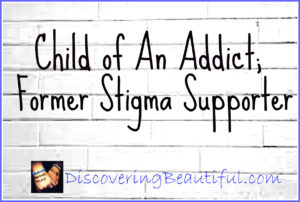
If anyone understands what the ramifications of guilt and shame associated with the relentless, ignorant, shaming of another human being feels like, it would be me.
Guilty.
I was twenty-five before I realized that maybe, maybe my mom wasn’t actually just a batshit crazy woman, doomed to forever be an infuriating, selfish person.
Seriously.
I am a former-stigma pusher.
When I was young, jumping on the popular bandwagon of the ill-informed people felt natural to me. I wanted to be normal and to live normal and to know what the fuck normal felt like. I didn’t want people to think that I was okay with how things were, because I wasn’t.
I wasn’t able to comprehend the complexity of our situation. I didn’t understand her, or her ‘chosen’ lifestyle choices, or her adult decisions that weren’t adult at all, all of which completely ruined my not-so-hand-picked childhood.
As a teen, I was just a bitter, egocentric, wounded young woman who had no desire to learn about her or the ‘why’ behind the curtain. I didn’t care. I knew enough and there was no story or sickness or explanations that were going to be logical enough for me to feel like she deserved to be excused for how my early life went.
But in the last 5-10 years we have actually been given specific, more accurate diagnoses.
They have explained away the majority of what experiencing my own addiction still hadn’t.
Her particular situation was and is so complex and sticky and messy, and is not as much her fault as it is her illnesses that have been amplified and worsened by long-term addiction and under or mis-diagnosis.
Looking back, one of the greatest, most fresh, ripe, vital resources that laid the groundwork for some of my own deep-seeded toxic shame (that I would later unpack after I became addicted), was the shaming and judgment that I endured indirectly, (oopsie) as people boastfully voiced their self-righteous opinions about my household.
Throughout my childhood, many people publicly and privately shamed my mom.
And the more I watched as she was taunted and shunned, and gossiped about, and the more rumors and snickers and whispers were spread, the more it began to devalue who I was.
And the more I hated her. casino en ligne le plus payant.
And the more I blamed her.
All of that played a crucial role in how I began to identify and how I saw my value as a person.
Lately, there has been a ton of public criticism of parents and caregivers who have overdosed in front of children or minors.
So, as a child of an addict, AND as a former judgmental asshole, here are a couple of things that I want people to know:
Those kids? They FEEL it all.
Like, ALL of it.
If we care so much about the suffering, health, well-being, and future of the children who are a part an addicted family, remember: before you sprint to and inject your opinions into the comment area, or within the confines of your own day-to-day interactions, do so with a little bit of mindfulness and maybe, even compassion.
Children feel emotionally connected to their caregivers and that means that what you say about their addicted or ill parent hits them much harder, and deeper than you might think.
They feel every one of your harsh, cruel, critical, degrading comment that you blindly shove their way, and they will wear your long-stares like an awkward, warm, microfiber blanket wrapped tightly around their still developing self-image.
Your judgment will not change things.
You are keeping them down, right where you believe their parents are: below you.
Unless you have been in that place you probably can’t imagine what they are already going through. They are trying to process things that move faster than they can go, that are far more complex than their brains can comprehend, and that are more damaging than an F5 tornado ripping through a mobile home community.
Addiction means maladaptive everything; irregular thinking, feeling, coping, seeing, and finally, being.
These children are over-compensating and are hyper-focused on looking like the rest of us. They spend a lot of time not being children, but running around in their own minds trying to sweep things up, hide and cover things and trying to decide if it is time for fight or for flight.
It would be a pretty accurate consensus to say that the deck isn’t stacked in their favor.
And guess how much your judgment of their caregiver or loved one does for their actual situation or how they feel or their odds of learning life skills and acquiring tools to acknowledge, process, reflect on and overcome their life experiences?
Exactly zero.